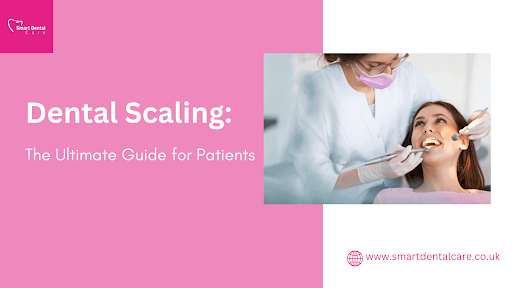Plaque and tartar are unavoidable, no matter how thoroughly you clean your teeth and maintain your oral hygiene. Every time we eat or drink, bacteria colonies develop in our mouths. While brushing and flossing help to remove these particles, some will remain.
Are you trying to hide your teeth when smiling due to plaque? This is where teeth scaling comes in. This teeth cleaning service removes the layers of plaque deposition that have accumulated over time.
This blog will further discuss dental scaling in detail. Keep reading.
What is tooth scaling?
The removal of plaque and tartar particles from the teeth is known as scaling. The dentist will take out the plaque along the tooth’s gum line, and the tooth will be smoothened to rejoin with the gums. Teeth scaling keeps teeth cavity-free and healthy for a more extended time.
This technique is relatively frequent and is performed on practically everyone. However, it is performed in conjunction with root planing. This is sometimes referred to as “deep cleaning.” Teeth scaling and root planing provide a deeper cleaning than routine cleaning, which also aids in the treatment of chronic periodontal disease.
When do you need teeth scaling?
- Those who neglect their dental hygiene and brushing are more likely to develop plaque and other periodontal diseases. Thus, they will require teeth scaling treatment.
- Others, despite self-care, cleaning, and flossing, also require expert dental care.
- Bleeding gums, foul breath, sensitivity, and colour stains are all signs that scaling is necessary.
- If you have a lot of plaque or tartar deposits on your teeth, you may need numerous cleanings–two to four times a year.
- Plaque deposits are typically produced by a poor diet, lack of dental hygiene, and the consumption of cigarettes, coffee, sweets, and tea.
- Professional Teeth Cleaning Services are critical for preventing periodontal disease and tooth decay.
What happens during teeth scaling?
- Before you begin, you will have a brief dental exam to determine the degree of the tartar, calculus, plaque, or other buildups threatening your oral health. This allows you to look for any problem areas that require extra attention.
- Using a local anaesthetic: A topical anaesthetic, generally in the form of a cream, will numb the region being treated. You can experience some uncomfortable motions, but the operation is non-surgical and will not hurt your teeth or gums.
- Scaling: The dentist will then use a scaler, a little hook-shaped device, to scrape off all of the plaque within your gums’ periodontal pocket. It will reach significantly deeper into the pocket and eliminate the plaque than brushing.
- Planing: The dentist or hygienist will polish the rough edges of your teeth’s roots with an instrument called a dental curette. This allows the gums to grow back into place much more quickly and without any harmful accumulation.
Does dental scaling hurt?
The dentist will numb your gums while you are having scaling and root planing done. You will not feel any discomfort throughout the operation. However, you may have some discomfort after the procedure. If you are concerned about the soreness of your mouth following treatment, you should see your dentist before proceeding.
Is dental scaling necessary?
Periodontal care is highly effective, and dental scale and planing is a suitable alternative for patients with gum disease or at high risk of developing gum disease and other dental concerns. If you have major tooth damage, have diabetes, or are a smoker, this may impair the efficiency of your treatment, which you should address with a dentist before proceeding.
Dental scaling can also lower the likelihood of requiring more treatment in the future, which might involve more unpleasant, complex, and costly procedures such as a root canal, tooth extraction, and the need to install crowns or Veneers Near Me.
What are the benefits of dental scaling?
- Get a brighter smile
Calculus can accumulate on your teeth over time, which can look yellow. Scaling and cleaning eliminates all hardened calculus before meticulously polishing your teeth, which lifts some surface stains.
- Prevent decay and cavities
The primary reason individuals go to the dentist is to avoid cavities. They occur as plaque begins to eat away at the enamel, the outer coating of your teeth.
Plaque is a sticky white bacterial build-up on your teeth. Brushing and flossing twice a day aids in plaque removal, and professional cleanings every six months are even more beneficial.
- Helps reduce bad breath
Whether you suffer from the persistent foul breath (known as halitosis) or an occasional spell of malodour, scaling can considerably alleviate the situation by removing the root of the problem.
Many individuals wrongly assume that their consumption produces foul breath, but this is not always the case. Tartar accumulation is frequently the issue. Therefore, the only method to permanently treat persistent bad breath is to remove the muck on your teeth and gums. Don’t forget to brush your tongue, as the hair on your tongue might collect odour-causing germs.
- Improve your overall health
Your mouth impacts the rest of your body more than you may realise. It may seem strange, but frequent dental cleanings can significantly lessen your heart attack and stroke risk.
This is because the persistent inflammation caused by gum disease can result in hardened arteries, which can lead to heart attack. Many other seemingly unrelated medical disorders, such as renal disease and diabetes, can be discovered early just by visiting the dentist. This treatment is also beneficial for veneers near me.
Conclusion
Although it may appear and feel like a powerful teeth cleaning service, dental scaling will not harm your teeth – this is a longstanding fallacy with no scientific basis. The procedure’s little discomfort is nothing compared to the agony and anguish of increasing tooth and gum problems, which will also be far more expensive to address.
